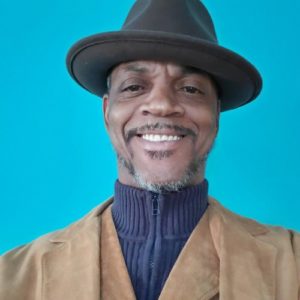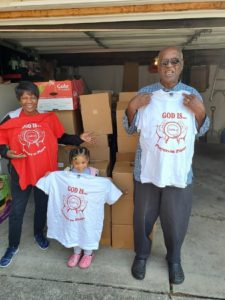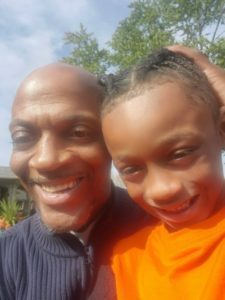Over the next few months, Tania and myself, Lily, will be highlighting our local food rescue heroes. In doing this work only briefly, we have been struck with the profound recognition of our own privilege, of our ability to go to the market and get as much food as we not only need, but want. Yet so many do not have the means to do so by no fault of their own. Through working with Hazon and other partner organizations, we have met those who have turned their lives into helping others, ensuring as many families can be fed as possible. For food insecurity is not a problem with lack of food per se, but with food distribution. These are people who have welcomed strangers into their home, put food on their plates, and in doing so have created a community that stands up for one another and helps with no questions asked. It is truly an honor to work alongside these heroes.
 When thinking about a food rescue hero to write about, we immediately knew the top candidate, a man we’ve known only briefly but whose words and spirit have begun to fuel us in our everyday work. Minister Antonio Hill emanates love, a kind of warmth so human it is one we have not felt in these many months of Covid-19. He moves with a sense of honesty, wasting no time on polite hellos but rather diving into questions you once did not feel prepared to answer. This took us aback when we first met Antonio. We knew this man would see through any walls we built up and he would not care. Somehow he broke down each one. With a full cup of coffee in his hands was a genuine conversation about the reality in which we live, and it felt like we had known this man for years. He speaks in proverbs, wisdom pouring out of him from the many lives in which he has lived, all rooted in being a black man in the city of Detroit, a city entrenched with rich black culture and systemic barriers our white bodies have never encountered. Antonio spent years in the military, a decade as a police officer, lived homeless on the streets, worked as a security guard, a minister, and now a master chef serving hundreds of families everyday. How, we asked ourselves, has one man lived so much and still carry such calm kindness in his eyes? It feels an injustice to paraphrase his words, as each one is heavy with sincerity. Instead, we want you to hear directly from him, and you might begin to understand the sense of holiness you feel when around him.
When thinking about a food rescue hero to write about, we immediately knew the top candidate, a man we’ve known only briefly but whose words and spirit have begun to fuel us in our everyday work. Minister Antonio Hill emanates love, a kind of warmth so human it is one we have not felt in these many months of Covid-19. He moves with a sense of honesty, wasting no time on polite hellos but rather diving into questions you once did not feel prepared to answer. This took us aback when we first met Antonio. We knew this man would see through any walls we built up and he would not care. Somehow he broke down each one. With a full cup of coffee in his hands was a genuine conversation about the reality in which we live, and it felt like we had known this man for years. He speaks in proverbs, wisdom pouring out of him from the many lives in which he has lived, all rooted in being a black man in the city of Detroit, a city entrenched with rich black culture and systemic barriers our white bodies have never encountered. Antonio spent years in the military, a decade as a police officer, lived homeless on the streets, worked as a security guard, a minister, and now a master chef serving hundreds of families everyday. How, we asked ourselves, has one man lived so much and still carry such calm kindness in his eyes? It feels an injustice to paraphrase his words, as each one is heavy with sincerity. Instead, we want you to hear directly from him, and you might begin to understand the sense of holiness you feel when around him.
Interviewer: Why did you get into food rescue work? What pushed you to do this?
Antonio: Covid was the opportunity. I’ve been a chef for many years and have always known there was a need to feed people. I used to feed people once a month and go into people’s homes, not just for my own spirituality but knowing what it was like to be hungry and how it drains the human out of a person to not have the energy to get up and the shame of what people might think. Most people I have spoken to over the years who are homeless have a story, they are not all drug users but victims of sexual abuse, job loss, the streets consumed them.
Interviewer: How do you think we can increase empathy on a large scale and alter the stigmas around homelessness?
Antonio: You need to understand the reason why people choose not to acknowledge homelessness is because it hurts. They don’t want to deal with it because it makes them have to look within themselves and take accountability. On an individual basis they pretend like it does not exist or blame the victim because they don’t want to feel responsible.
Interviewer: How did you yourself get out of living on the streets? What advice would you give to others in similar situations?
Antonio: I never stopped believing. There was a lady you two both know who shifted my self awareness; Wren Hack told me I had a life worth living and made me realize that for myself. Find somebody that is going to tell you that you’re worth something. Tell yourself this is where I am not who I am. If you shift the paradigm of your thinking, you put yourself first. It takes years to combat the fear of addressing your inner personal demon. Find something you believe in and give it everything you got, all day and night. Pray for yourself and the people around you. Find something to do to help somebody else while you’re going through what you’re going through and it’ll help you.
Interviewer: You speak a lot about faith in your everyday life. What role has faith played for you?
Antonio: When I was a child we had very traditional religious practices that took place and some of the practices crippled me because it made me think inside of a box that every mistake I made would get me closer to hell. Then I went to war and saw people die for what they believe in. One day I heard a small voice say to look for me, God, in everything that you see and see how you feel. That’s why I talk so much from a faith based place. If God had never broken down the anger I have for myself and society I wouldn’t be here today. Love conquers everything, we can never combat racism with hatred because racism is hatred. Slowly injecting love into every situation continually, and it can’t stay the same.
 I am a church without walls because everywhere I go I take my love and spirit of God with me. I see you with love no matter what you’ve done and who you are. I see you as a clay molded by God, I see you for what you are, I see you as a reflection of God. I love you naturally because there’s a God that lives in me and you. Whether or not you see it, I see it.
I am a church without walls because everywhere I go I take my love and spirit of God with me. I see you with love no matter what you’ve done and who you are. I see you as a clay molded by God, I see you for what you are, I see you as a reflection of God. I love you naturally because there’s a God that lives in me and you. Whether or not you see it, I see it.
Interviewer: What did you do with all that anger? How do you process it on a day to day basis?
Antonio: Pray, look for the good in people versus the negative. I used to have issues talking about my life and then I realized that was what held me back and now I’m free. When you get to a place that you are so broken where there is nothing left but to be fixed you open up and take it. Who saved me? Being able to express myself changed the way I thought of things because I could go to the kitchen with little to nothing and could do whatever I wanted with the food. It was an art form for me, I was able to flavor it however I wanted, I had no restrictions. Food is a universal language. It brings people closer, it is so important to me. Children who go to bed hungry and have to go to school on an empty stomach don’t learn well because an empty human belly closes your human ears.
Interviewer: As a suburbanite I often only hear of the fear surrounding Detroit, the danger and poverty, yet there is so much more to this city. What do you wish people knew and loved about the city of Detroit?
 Antonio: We are one of the most diverse loving cities in the nation. Every place you go someone will tell you it’s worse off. Detroit is its people, not the scene that makes the news. The majority of the people are hardworking and non-violent. The biggest thing Detroit has to offer is its people. Like blades of grass, you can walk on us and walk over us but the rain falls and the sun comes out and the people come back. The sustainability of us is not what you see on the news. People like me don’t get news coverage. You don’t see the good on the news, if you did people would have a different attitude of my city. I love every aspect of my city, the good and the bad. It’s my city.
Antonio: We are one of the most diverse loving cities in the nation. Every place you go someone will tell you it’s worse off. Detroit is its people, not the scene that makes the news. The majority of the people are hardworking and non-violent. The biggest thing Detroit has to offer is its people. Like blades of grass, you can walk on us and walk over us but the rain falls and the sun comes out and the people come back. The sustainability of us is not what you see on the news. People like me don’t get news coverage. You don’t see the good on the news, if you did people would have a different attitude of my city. I love every aspect of my city, the good and the bad. It’s my city.
It seems impossible when we think about this man’s life and his unwavering positivity. He has lived through wars and riots and hunger, yet he still sees so much good in this world. Antonio creates divinity in every space he is in, for he finds the goodness in you when you yourself cannot see it. He is more than his titles, more than his struggles. He is a man who takes care of others even when he does not have the means to take care of himself. After the interview we spoke about the many protests in which we have attended. He told us to call him any time we need for anything, whether we are marching and in danger or just visiting the city. He welcomed us into his home, and in just the first few weeks of our internships, made us feel like family, a family we hope lasts a long time. We are honored to know Minister Antonio Hill, our personal hero.
Interviewed and written by Lily Kollin and Tania Miller, Hazon Detroit’s Repair the World Serve the Moment Fellows




Comments are closed.